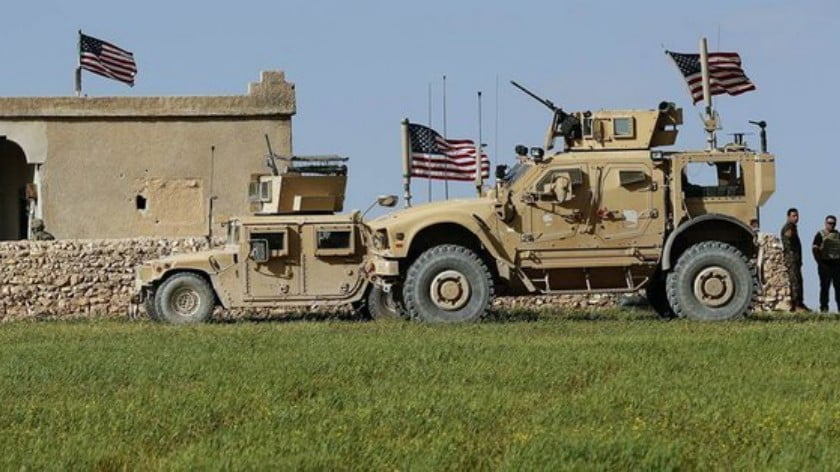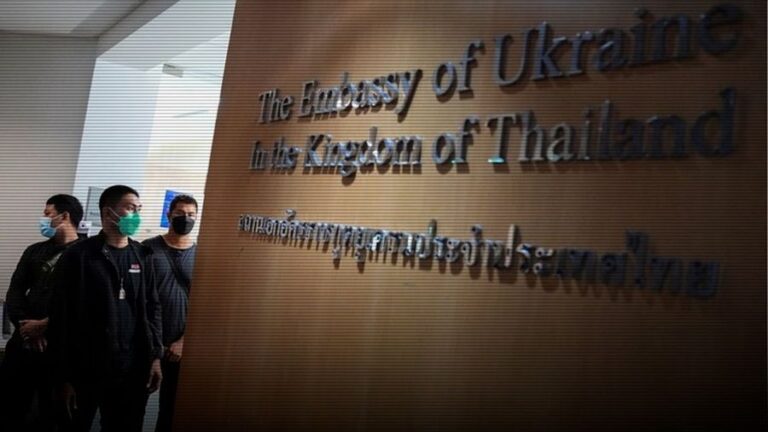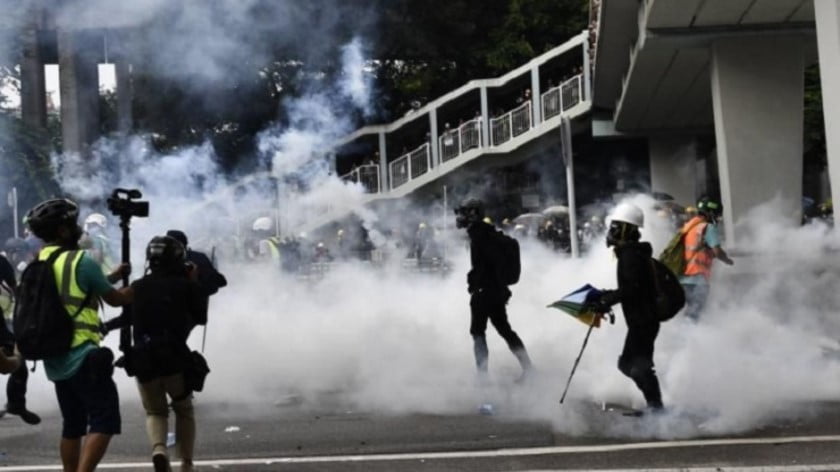USA Announces Withdrawal from the Levant: Time for All Parties to Rethink Their Next Move
The sudden announcement of the imminent withdrawal of US forces from north-east Syria is being widely criticised by US pundits, think-tank analysts, and many US establishment voices. They claim that President Donald Trump’s decision may create a vacuum soon to be replaced either by an Iranian proxy militia or by Turkey. But in reality, the deepest fear of Trump’s Washington critics seems to be that Syrian territory occupied by US forces will be returned to the control of Syrian government forces.
Another weak argument made by many of these enthusiasts is that areas currently occupied by the US might fall into the hands of the terror groups Islamic State (ISIS) or al-Qaeda; the latter are currently operating in Turkish occupied areas of Syria in the northern city of Idlib.If this concern is genuine, how do Trump’s critics explain the US failure to eliminate the ISIS pocket along the Euphrates in the province of al-Hasaka during its two-year occupation of north-east Syria? And finally, Trump’s critics have inevitably mixed all the above arguments with their favourite phobia, claiming that Russia and of course Iran are the only countries set to benefit from this unwise US move.
In fact, the presence of US forces in the Syrian province of al-Hasaka and at the Iraqi-Syrian crossing of al-Tanf is a real burden on the US administration, and a dangerous one in the long term. Withdrawal from the Syrian quagmire will strengthen the moral and strategic position of the US in the region. While President Trump wisely declares victory over ISIS as his “mission accomplished” pretext for leaving Syria, regional observers know that it is in fact the Syrian government, together with Russia, Iran and other allies, who have managed to defeat ISIS throughout the Syrian geography they occupy today.
In February 2018, when Syrian forces tried to cross the Euphrates to hunt down ISIS, US forces attacked them and destroyed many convoys, resulting in the deaths of hundreds of Syrians and Russian contractors fighting for the annihilation of ISIS.
Again, in July 2018, when Syrian forces and their allies tried to hunt down ISIS in the Syrian steppe, ISIS crossed to safety into the 55km secure area established by US forces around the al-Tanf crossing, under the protection of US fire. Once more, US and British forces destroyed several military vehicles belonging to the Syrian Army and their allies. The message was clear: do not approach the area under any circumstances, regardless of ISIS’s operational presence in the area.
When Turkey attacked Afrin in January 2018, US forces did not support the YPG and PKK based in the Kurdish northern provinces but left them to their fate to join the millions of refugees internally displaced by the war imposed on Syria. The Kurds refused to allow the Syrian army to stand against the Turkish invasion even at the cost of losing their lives, wealth and properties. The Kurds of Syria followed the same path as their brothers in Iraq, believing the US would champion their cause. They failed to understand that the US establishment is far from being a charitable institution and acts purely in its own interests and not for those of the Kurds, nor for the well-being of the Middle Easterners in general.
The US establishment did not stop here: in August 2018 it warned Russia and Damascus against any attack on the jihadist stronghold in Idlib, on the fantasised pretext that Syria’s government might use chemical weapons. It has offered moral and physical protection to the thousands of jihadists, including al-Qaeda, based in Idlib. US withdrawal would remove US protection from the jihadists, making their survival contingent on Turkey’s ability to restrain them from violating the agreement on Idlib between Russia, Iran and Turkey.
The US establishment was never really serious about fighting ISIS and al-Qaeda. When Obama was in power, he looked on whilst ISIS grew strong in Iraq in 2014-15, aware that it would expand into Syria. His deep concern for the environment led him to avoid attacking thousands of ISIS oil trucks – securing over 1 billion dollars monthly finance for the terror group, among their other sources of income – all for fear of polluting the air over Syria and Iraq.
When Trump took power, he promised to pull out of Syria. Nevertheless, warmongers hawks in his inner circle convinced him to stay, and much longer than expected. He offered military support to the Israeli Air Force by allowing landing rights in al-Hasaka to Netanyahu’s jets as a base for them to attack nearby targets of the Syrian army, the Iranian T4 base, and, on June 2018, the command and control baseof Iraqi al Hashd al-Shaabi security forces along the Iraqi-Syrian borders.
Baghdad complained about the US presence and decided, under its new prime minister Adel Abdel Mahdi, to dispatch the bulk of Hashd al-Shaabi forces to the borders in order to limit US and ISIS movements in the area.
In southeast Syria the US has found itself surrounded by Iraqi and Syrian forces, who are determined to stop ISIS from crossing both the Euphrates and the Iraq/Syrian borders. Meanwhile, the US is supplying resources, at a very high cost, to tens of thousands of Syrian refugees at the al-Rukban refugee camp with no apparent corresponding benefit.
As for those who naively claim that US withdrawal would allow the forces of Tehran and its allies to move into al Hasaka to fill up the void, in fact, the Islamic Republic of Iran transported thousands of tons of missiles, weapons, food, medicine and all the basic infrastructure needed for the survival of the Syrian establishment for years without ever using al-Hasaka, which is where the US is based today. Of course, it would be a victory for Iran to see the US pulling out because this would help its main ally, Bashar al-Assad, regain control of almost a third of Syria with its oil and gas resources, and stop Turkey from occupying more territory in the north.
The US move will benefit Syria and Syrians most of all. It will benefit Russia and the prospects for world peace by significantly reducing the possibility of conflict between the two superpowers, whose forces are operating in close proximity to one another.
There have already been lethal contacts between the US and Russia in the Levant, miraculously without consequences to date. Iran will be happy to see the US departing from Syria. US withdrawal will appease Turkey’s concern about YPG forces collaborating with the PKK on its borders, and will reduce the likelihood of an extended Turkish occupation of Afrin and Idlib. Iraq will benefit from not having to commit so many forces to watching the US, trying to limit the movements of US forces and potentially clashing with them. However, Israel’s belligerent government may regret the loss of access to US airports to use over Syrian occupied territory. In any case, Israel certainly doesn’t lack support from the US and its allies in the Middle East, providing platforms for its own objectives and purposes.
All the above presupposes a serious US withdrawal from Syria. Such a withdrawal may take the announced interval of 60 to 100 days, but it may take longer. In any case, this interval will give all parties time to rethink their strategies. It will encourage the Kurds to return to Damascus and resume unconditional negotiations with the government. It will give Turkey time to think about its next move, and allow Syria to plan reconquest of the rest of its occupied territory in 2019.
If Damascus and Moscow believe they can handle Idlib and al-Hasaka without the help of their allies, Iran can be expected to begin the withdrawal of thousands of men from Syria, without thereby terminating its alliance with the Syrian government. And If Trump doesn’t finally pull out, he has certainly managed to divert the attention away from the Khashoggi murder and the resulting direct criticism of the president from Congress. He indeed give plenty of food for thoughts to the Kurds about what they can expect from the US in the future.
By Elijah J. Magnier
Source: Elijah J. Magnier








